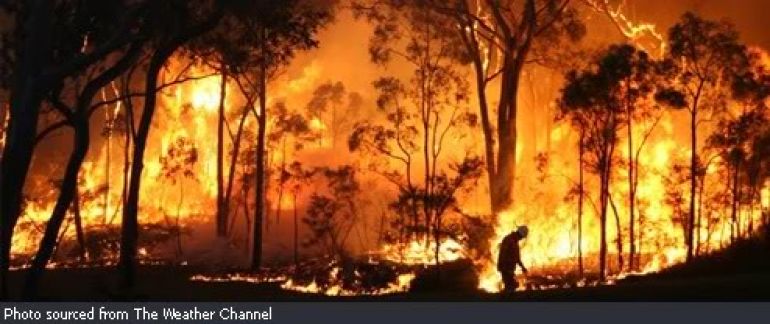Preparing for Bushfire Season
It's that time of year again. The sun's come out, the fire bans are in place and the question arises - What's your bushfire plan? All houses are at risk of fire and it's important to protect against it and know what to do in the case of one.
The Black Saturday bushfires of 2009 were a harsh reminder to us all about the threat of bushfires. Many people who believed they were safe were killed by the flames and the destruction was extremely widespread. My house was only half an hour's drive from the blaze and many of my friends were affected by the fires. We watched as the sky turned a scary orange-red and the air was filled with ash.

So it's on that reflective note that we come to the heart of the matter. What's your bushfire plan and how are you protecting your house and family from the threat of one?
Rural areas and urban areas with a high level of bushland are most at risk, but even your regular suburban street could be in danger should a fire pass through. While fires often start naturally, sometimes they're deliberately lit and the dry grass along the roadside or plants in your garden will provide as good fodder for a bushfire as regular bushland does.
So what can you do? The first step is to...
Be Prepared.
Take a look around your house and garden and think of the things that would be most dangerous should a fire occur.
- Leaves in your gutters could encourage the fire onto your roof - ensure your gutters, downpipes and roofs are kept free of detritus and fit quality leaf guards.
- Wood piles should be kept far from the house and covered
- Affix quality wire screens to your windows and any vents on roof voids to prevent sparks from entering your home. (You may want to do a bit of research here, as some wire screens are far more effective at preventing sparks than others. Some councils now enforce specific types to protect against fires)
- Tidy up your garden - trim back overhanging branches, regularly cut your lawn and rake up loose leaves and twigs.
- Never leave piles of grass clippings and garden waste near your house and do not dump them onto council reserves or bushland as these will only add to the fire's intensity
- Check your garden hoses - Are you able to reach every point around the house's perimeter with them? Are they all functioning correctly? Check that all fire pumps, hoses and accessories are in working order and ensure that all family members know how to operate them.
- Any gas cylinders around your home should have their pressure relief valves facing outwards so that any flames would not be directed towards the house
- Ensure that any fire hydrants around your home are easy to access and that everyone knows where they are
Have a Plan
If a fire occurs, what do you do? Is someone in charge of grabbing the kids and taking them outside? Is there a safe place you can all get together? If it's a serious bushfire, are you in a position to try and defend your home? If you go to leave what roads will you take? Where will you go? Who will go with you?
A lot of these questions could relate to any regular housefire, so even if you don't think you'd ever be at risk of a bushfire it's still important to consider them.
These are all very serious questions to consider and there's a lot that goes into determining your Bushfire Survival Plan. The NSW Government website has some great information on how to go about making your plan and what to consider - check it out here.
The important thing is to make your decision far in advance and to be prepared to stick to it. You won't be able to 'wait and see' - you'll need to be ready to act instantly.
Be Aware
Fires won't call in advance to say they're coming and emergency warning systems may not always work or may be unable to reach you, so it's important to seek information out for yourself.
Be aware of what the fire danger rating is in your area and if any fires do break out nearby keep on top of it via the internet (your government fire safety website will most likely have live updates), radio, television, mobile phones and your neighbours.
If you receive a fire warning for your area then you must take it seriously and act immediately.
Get more Information
Find out more about preparing for fires at the following websites:
- http://www.fire.nsw.gov.au/
- http://www.cfa.vic.gov.au/
- http://www.fire.qld.gov.au/
- http://www.cfs.sa.gov.au/
- http://www.fesa.wa.gov.au/
- http://www.pfes.nt.gov.au/Fire-and-Rescue.aspx


